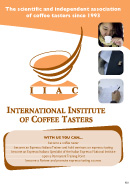Innovation, evolution or revolution?
by Luigi Odello
Secretary General of the International Institute of Coffee Tasters, he is also a lecturer at the University of Udine, Verona and at the Cattolica in Piacenza. In addition he is the Chairman of the Taster Study Center and Secretary General of the Italian Espresso National Institute
 In the next few years it will not be easy to keep up with innovation in the coffee sector, but, no doubts, it will be a fascinating time. In this issue of Coffee Taster, we shall deal with sensorial trends and what the big companies say with regard to the methods they use to monitor quality. Not far from now, at EISday2008, the annual conference of the Italian Espresso National Institute on the 24th of February, we will focus on the findings of the biggest ever research which has been conducted into the quality of coffee.
In the next few years it will not be easy to keep up with innovation in the coffee sector, but, no doubts, it will be a fascinating time. In this issue of Coffee Taster, we shall deal with sensorial trends and what the big companies say with regard to the methods they use to monitor quality. Not far from now, at EISday2008, the annual conference of the Italian Espresso National Institute on the 24th of February, we will focus on the findings of the biggest ever research which has been conducted into the quality of coffee.
This is precisely what made us think about evolution/innovation in our sector: how many operators are ready to benefit from it? And how many will suffer from heavily negative consequences? The fact is that, outside the micro cosmos of each operator, there is a world which is changing at an unbelievable pace, but many people seem not to realise this.
Many producing country are moving towards a European-type of qualification of their productions. This will lead them to offering a better product and to wanting more money. At home people will increasingly use single-dose coffee or coffee in beans as a result of the existence of new technology machines which are more reliable and effective. People at home will drink a better quality coffee and the same will happen at the workplace. At home, and perhaps even at the restaurant, coffee will be part of a new ritual: single origins coffees will become more and more popular, a pleasure to share with friends, maybe extracted with a moka pot so that you can actually see the coffee coming.
It is, therefore, reasonable to wonder whether roasters and, especially, baristas are ready for this. The former will find themselves dealing with producers of green coffee and with a different style of coffee consumption, both inside communities and at home. Most probably, those who have not done it yet will have to establish direct contacts with the producers of green coffee, meet a new type of demand for home consumption and for serving and take care of their coffee bars – currently suffering from a reduction in consumption which could become even worse in future – in Italy with a different approach. For many Italian roasters, coffee bars are a strategic sector which is being governed by new mechanisms. The methods for attracting clients and handling them will change. The magic word will be training.
The International Institute of Coffee Tasters, which has always adopted this approach, is currently a reference point at an international level – with a tested method and with effective training instruments. Through its research activity, it is also an attentive observer of the evolution of consumption and quality of coffee as well as the relevant machinery. In 2008, in addition, we will have a new edition of “International Coffee Tasting”: could there be a better occasion for monitoring world evolution?

